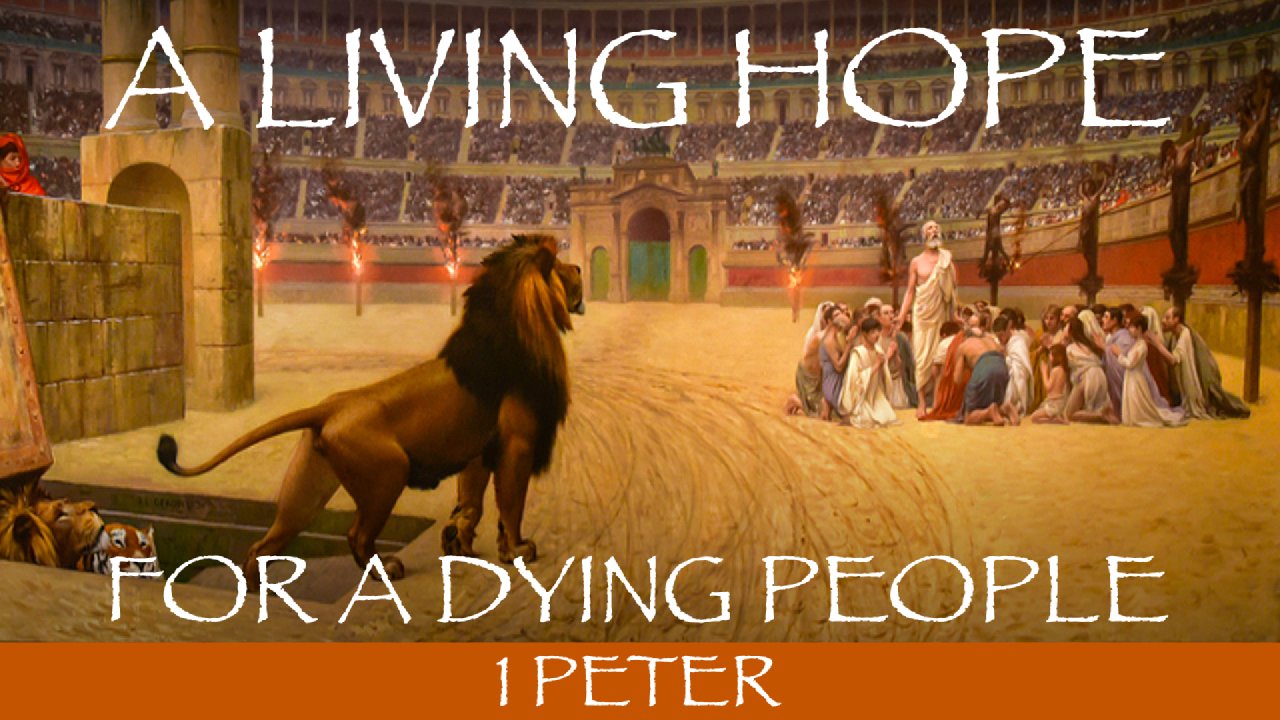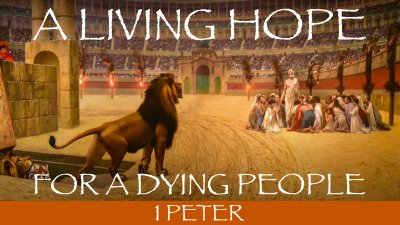Every Sunday we gather to celebrate the Lord’s resurrection. Sunday is the Lord’s Day because Jesus rose from the grave on the first day of the week. Instead of working six days to get one day of rest, as under the old covenant, the new covenant begins the week with resurrection and rest in Christ. The six days of our work week proceed from Christ’s finished work.
Still, on the Christian calendar, this Sunday is the day when we celebrate the culmination of Holy Week. Friday remembers the death of Christ, and tonight we will gather at 7:00pm to celebrate Good Friday. Saturday remembers Christ’s burial and the sense of loss that stood between the cross and resurrection. And finally, Sunday celebrates the cosmos-shattering, justification-granting resurrection—what is often called Easter.
This Sunday we will gather outside to proclaim out loud and in public that Jesus is Alive. He has risen from the dead. He is risen indeed. And he is worthy of our gathered worship.
If you remember, last Easter we did not gather. Still assessing the situation of COVID-19 we sheltered at home and celebrated independently. But this year, as COVID and fear of COVID continue to rise and fall around us, we will gather on Sunday to celebrate the only vaccine for death—the death and resurrection of Jesus Christ.
Outside, at 10:00am, we will sing songs, read Scripture, pray, celebrate three baptisms, hear Scripture preached, take communion, and sing more songs. Truly, we have a wonderful God who deserves everlasting worship. And Sunday we will gather to proclaim this together.
In preparation, please pray for our service and those friends, family, and guests who have been invited. Take time to read the events of Holy Week—Mark 11–16 is a good place to begin. And on Sunday, come early and bring your camping chairs.
We expect a good number of visitors, so if you can arrive in one car (instead of three), please do so. Additionally, there will be some parking down Springwoods, so consider dropping off family and then parking to leave space for others in our parking lot. Last thing: sunglasses, warm clothes, a bottle of water, and allergy medicine might all be helpful for you as we return to service outdoors. (FYI: After Easter, we will continue inside until the month of May).
For this Sunday, I am super excited to rejoin you outside. May God be pleased to give us great weather that matches the great and gracious gospel of Jesus Christ. For indeed, his gospel is great and on Sunday we will extol the greatness of his grace and truth. I hope to see you then.
For His Glory and your joy,
Pastor David
--------------------------------------------------------------------------------------------------------------------------------------------------------------
Discussion & Response Questions
1 Peter and the Resurrection of Christ
1. What does 1 Peter teach us about the resurrection (see 1:3–5, 23–25; 2:6–8; 3:21–22)?
2. Does Peter speak directly about the resurrection or does he include the resurrection into other discussions? If the latter, what does that teach us about the resurrection and its place in our lives and conversations?
3. How did God bring about the cross of Christ? What do you learn about God by considering the resurrection in eternity and time?
4. What are ways the resurrection changed the world (think cosmic powers and redemptive history)? Why is it important to understand the cross and resurrection in the story of the world before making a personal application?
5. What are ways the resurrection changed your life? What is most encouraging to you as you think about Christ’s resurrection?
6. If the resurrection did not occur, would it still be worth living the Christian life? Why or why not?
7. How does suffering and persecution increase our appreciation for the resurrection? Why is the resurrection necessary for obedience—especially in the face of opposition?
8. What other truths in 1 Peter 1–2 have encouraged you recently?

9. Beholding the Resurrection of Christ ... In Eternity and Time (1 Peter 1:20-21; 2:4-10)
Sermon
April 4, 2021 • David Schrock
19. Mission Accomplished: Grace from Beginning to End (1 Peter 5:5-15)
June 27, 2021 • David Schrock • 1 Peter 5:5–14
In John 1:14–18, the beloved apostle describes the grace of the law and the greater grace of the gospel as “grace upon grace". And in his opening words to his Gospel, he explains that grace and truth are now found in the person and work of Jesus Christ, the Lord Incarnate. At the end of Peter’s letter, the same emphasis on grace is seen. Only the largesse of God’s grace is not found in redemptive history, but in the church’s personal experience of grace. Throughout Peter’s letter, the restored apostle has testified to the true grace of God that is found ready to aid all those who are born again by the Spirit. Even more, Peter has explained the sufferings of Christ’s followers in terms of the sanctifying grace that accompanies such fiery trials. Knowing this grace strengthens believers to follow Christ fully. And this Sunday, as we come to the end of 1 Peter, we will conclude our sermon series by considering all that Peter says about grace in 1 Peter 5:5–14. As you have time, please read 1 Peter 5 to prepare for Sunday. You may also find help in reading James 4 or Proverbs 3 in preparation for worship. Pray that God would continue to lavish his grace upon us, as we cast our cares on him and find fresh mercies to follow him fully. I look forward to seeing you Sunday and to worshiping the true God of grace with you. For His Glory and your joy, Pastor David -------------------------------------------------------------------------------------------------------------------------------------------------------------- Discussion & Response Questions for 1 Peter 5:5-14 1. Why should humility be a distinctive mark of the church? 2. How is humility to appear in our relationship to elders, to one another, and to God? (vv. 5-7) 3. The Greek word for “opposes” (v. 5) and “resist” (v. 9) is identical. What does this teach us about humility, pride, and spiritual warfare? 4. How are prayerfulness (v. 7) and faith (v. 9) connected to humility? 5. What is the role of humility when it comes to resisting the devil? 6. What truths should the church remember when they suffer persection? 7. What promises and words of encouragement and assurance does Peter give to the church? (vv. 5, 6, 7, 10) 8. Look for the repetition of grace in this text (vv. 5, 10, 12). How does this instruct us? 9. Practically, what does it look like to stand firm in the gospel? How might we grow in standing firm? 10. How might this text shape our resolve as Christians?
18. Good Shepherds: 7 Marks of a Faithful Under-Shepherd (1 Peter 5:1-4)
June 20, 2021 • David Schrock • 1 Peter 5:1–4
Forbes Magazine lists 100 Quotes on Leadership. When bookstores used to be brick and mortar, you could always find a leadership section. And aspiring leaders may spend (tens of) thousands of dollars each year on coaching, conferences, and other ways to become better leaders. In the Bible, we also find a lot about leadership. But what we don’t find are leadership techniques. Instead, we find offices like prophet, priest, king, and shepherd. We discover that the greatest leader laid his life down for those whom he loved. And in Christ and those who followed him, we are given a vision of what a leader is. We also find many examples of bad leaders too. Simultaneously, in both testaments, we find lists of qualifications for leaders (see Exodus 18, Deuteronomy 17–18; 1 Timothy 3; and Titus 1). These lists are always based on character, and if anyone wants to be a leader in the church, they must look to God’s standards. This Sunday, we will do just that. Writing to a suffering church, Peter addresses the lead sufferers, the shepherds who are leading the sheep. In less than five verses, we will discover in 1 Peter 5:1–5, a host of characteristics that you should recognize in those who lead the church. And current and aspiring leaders should be able to test themselves by these verses too. To prepare for Sunday, please read 1 Peter 5. You will also be helped if you read Ezekiel 34 and John 10. These two background passages will give you the biblical context for Peter’s words, as they show what a good shepherd is and is not. After spending a week with a flock of shepherds at the SBC this week, I am glad to be with you and to be one of your shepherds. It is one of the greatest joys in my life. And as we come to the text of 1 Peter 5, let us pray that the Chief Shepherd, Jesus Christ, will continue to shepherd us as we hear his voice and follow his lead. See you Sunday (DV). For His Glory and your joy, Pastor David ---------------------------------------------------------------------------------------------------------------------------------------------- Discussion & Response Questions for 1 Peter 5:1-5 1. What is significant about how Peter describes his identity? How does this set the tone for this exhortation? 2. How does Peter describe the work of an elder? 3. What qualifications does Peter give for the motives of elders in their ministry? 4. What is the difference between an elder, a shepherd, and an overseer? What nuances do these words give in describing the same office? 5. “that is among you.” What does this say about the work of shepherding? 6. How does willingness, eagerness, and living as an example bless the flock? 7. What are some of the differences between a good shepherd and a not-so-good shepherd? (See also Ezekiel 34 and John 10) 8. How do wrong motives distort the work of pastoral ministry and damage the church? 9. How does Peter describe Christ? 10. What is the elders’ responsibility to Christ? 11. What does this text reveal about hierarchical relationships in the church? 12. What exhortation does Peter give to the congregation? What exhortation and caution does Peter give to both the elders and the congregation? 13. How should we respond to God’s design for the church? 14. How should we respond to these promises of grace and glory?
17. Preparing Our Head, Heart, and Hands for the End of the World (1 Peter 4:12-19)
June 13, 2021 • David Schrock • 1 Peter 4:12–19
Chicken little said the sky is falling and it seems many Christians say the same when they think about current events and the end of the world. But is that how the Bible speaks about the end of the world? This Sunday we will consider the end of the world and the grace of God which purifies us through the fiery trials that God has prepared for us. As you prepare for Sunday, take time to read 1 Peter 4:12-19. But also read over 1 Peter and consider the ways Peter talks about the end. This will help you to see what we all will see in 1 Peter 4:12-19 this Sunday. As I write this from Indianapolis where I am teaching eschatology, I can’t wait to get home and worship our risen Lord with you. May the exalted Christ be praised in our assembling. For His glory and your joy, Pastor David ----------------------------------------------------------------------------------------------------- Discussion & Response Questions for 1 Peter 4:12-19 1. Does persecution and suffering seem like a stranger to you? Instead of being surprised by sufferings, what does it look like for us to be surprised by joy? 2. Does rejoicing, gladness, and blessing come to mind when facing suffering? 3. How does Peter reassure and encourage the church? 4. Consider Peter’s command to glorify God (v. 16). Might one be tempted to be ashamed? See Acts 5:40-42. 5. What does it mean that judgment begins at the house of God? Why does Peter insert this warning? (vv. 17-19) How should we respond to this? 6. What does it mean to “obey the gospel of God”? 7. How does Peter teach them to suffer (v. 19)? What is the sufferer to do? Consider Psalm 31:5; Luke 23:46.





